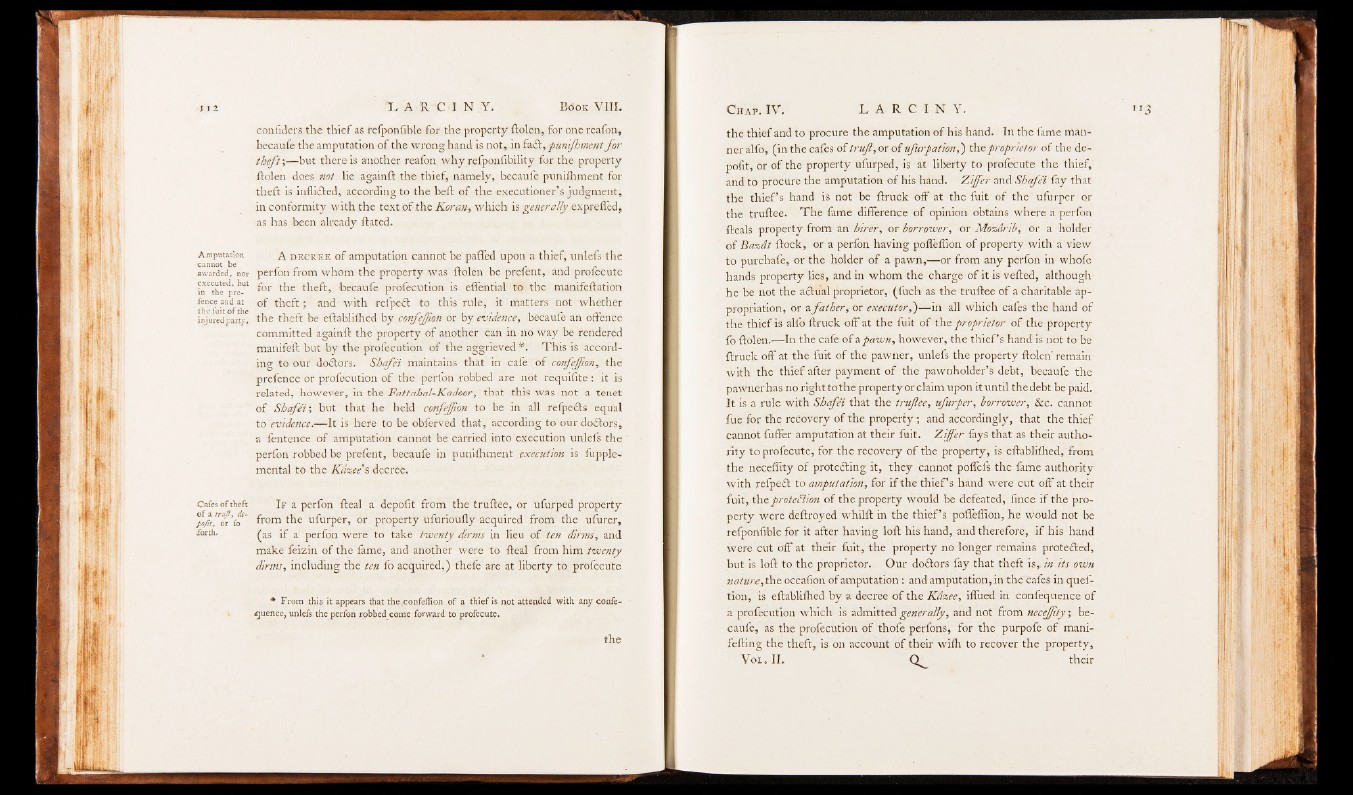
Amputation
cannot be
awarded, nor
executed, but
in the prefence
and at
the fuit o f the
injured party.
Cafes o f theft
o f a trufty de-
JioJit, or fo
forth.
confiders the thief as refponfible for the property ftolen, for one reafon,
becaufe the amputation of the wrong hand is not, in faCt, punijhment fo r
theft;— but there is another reafon why refponfibility for the property
ftolen does not lie againft the thief, namely, becaufe punilhment for
theft is inflicted, according to the beft of the executioner’ s judgment,
in conformity with the text of the Koran, which is generally exprefled,
as has been already Hated.
A decree of amputation cannot be paffed upon a thief, unlefsthe
perfon from whom the property was ftolen be prefent, and profecute
for the theft, becaufe profecution is eflential to the manifeftation
of theft; and with refpeCt to this rule, it matters not whether
the theft be eftablilhed by corfefjion or by evidence, becaufe an offence
committed againft the property of another can in no way be rendered
manifeft but by the profecution of the aggrieved *. This is according
to our' doCtors. Shafei maintains that in cafe of corfefjion, the
prefence or profecution of the perfon robbed are not requiftte: it is
related, however, in the Fattahal-Kadoor, that this was not a tenet
of Shafe'i; but that he held confeffton to be in all refpeCts equal
to evidence.— It is here to be obferved that, according to our do&ors,
a fentence of amputation cannot be carried into'execution unlefs the
perfon robbed be prefent, becaufe in punifhment execution is fupple-
mental to the Kdzee’s decree.
I f a perfon fteal a depolit from the truftee, or ufurped property
from the ufurper, or property ufttrioufly acquired from the ufur.er,
(as if a perfon were to take twenty dirms in lieu of ten dirms, and'
make feizin of the fame, and another were to fteal from him twenty
dirms, including the ten fo acquired,) thefe are at liberty to profecute
* From this it appears that the.confeilion .o f a thief is not attended with any confe-
ajuence, unlefs.the perfon robbed come forward to profecute.
the
the thief and to procure the amputation of his hand. In the fame manner
alfo, (in the cafes of trujl,or of ufurpationj) theproprietor of the de-
pofit, or of the property ufurped, is at liberty to profecute the thief,
and to procure the amputation of his hand. Ziffer and Shcfei fay that
the thief’s hand is not be ftruck off at the fuit of the ufurper or
the truftee. The lame difference of opinion obtains where a perfon
fteals property from an hirer, or borrower, or Mozdrib, or a holder
of Bazdt ftock, or a perfon having pofleflion of property with a view
to purchafe, or the holder of a pawn,— or from any perfon in whofe
hands property lies, and in whom the charge of it is veiled, although
he be not the aCtual proprietor, (fuch as the truftee of a charitable appropriation,
or a father, or executor,)— in all which cafes the hand of
the thief is alfo ftruck off at the fuit of the proprietor of the property
fo ftolen.— In the cafe, of a pawn, however, the thief’ s hand is not to be
ftruck off at the fuit of the pawner, unlefs the property ftolen remain
with the thief after payment of the pawnholder’s debt, becaufe the
paw ner has no right tothe property or claim upon it until the debt be paid.
It is a rule with Shafei that the truftee, ufurper, borrower, &c. cannot
fue for the recovery of the property; and accordingly, that the thief
cannot fuffer amputation at their fuit. Z,iffer lays that as their authority
to profecute, for the recovery of the property, is eftablilhed,'from
the neceflity of protecting it, they cannot poflels the fame authority
with refpeCt to amputation, for if the thief’ s hand were cut off at their
fuit, the prote&ion of the property would be defeated, lince if the property
were deftroyed whilft in the thief’ s poffeflion, he would not be
refponfible for it after having loft his hand, and therefore, if his hand
were cut off at their fuit, the property no longer remains protected,
but is loft to the proprietor. Our doftors fay that theft is,, in its own
nature, the occalion of amputation : and amputation, in the'cafes in quef-
tion, is eftablilhed by a decree of the Kdzee, ilfued in confequence of
a profecution which is admitted generally, and not from necejftly; becaufe,
as the profecution of thofe perlons, for the purpofe of mani-
fefting the theft, is on account of their wilh to recover the property,
Vot , II. O their